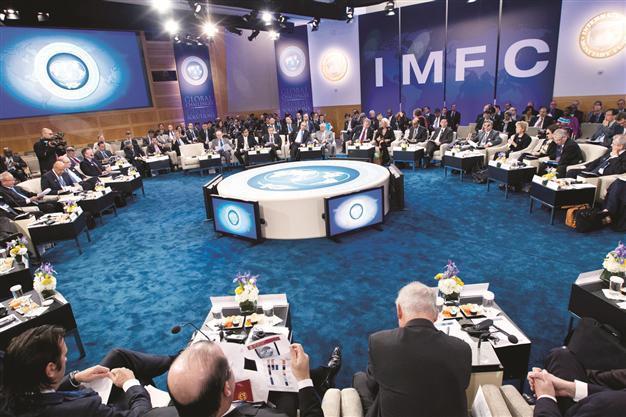IMF must be ready for aid ahead of Fed exit
WASHINGTON - Reuters

The IMFC meeting begins during the World Bank/IMF Annual Meetings at International Monetary Fund headquarters on Oct 12, in Washington. AP photo
Global finance chiefs has told the IMF to stand ready to aid emerging market economies that could be destabilized by a sudden flight of capital when the U.S. Federal Reserve and other central banks back away from ultra-loose monetary policies.
The International Monetary Fund’s governing panel on Oct. 12, after a semi-annual meeting, acknowledged the risks posed by a transition toward more normal policies in advanced economies, and it urged nations not to delay preparations.
“The key task is to focus on the transition, prepare ourselves well for this eventual normalization,” the committee’s chairman, Singaporean Finance Minister Tharman Shanmugaratnam, told reporters. “It’s not imminent, but it will happen.”
A wave of selling spread quickly through world financial markets this year after the Fed, responding to signs of stronger U.S. growth, said it could start winding down its economic stimulus program by year end.
Developing countries most affectedThe pain was felt most severely in developing countries as a gusher of cheap dollars that had poured into their economies dried up, sparking a sharp slide in stock prices and currencies and pushing up local interest rates.
Low interest rates in developed economies, engineered by their central banks in recent years, had spurred investors to hunt for higher-yielding assets, many of which were found in emerging markets.
When the U.S. central bank does move to reduce stimulus, the repercussions “may be even more significant,” said Zeti Akhtar Aziz, chief of Malaysia’s central bank. Aziz said the IMF’s “policy toolkit” needed to expand to help cope with the fallout.
The U.S. central bank has held interest rates near zero since 2008 and has tripled its balance sheet to roughly $3.7 trillion. Over the last year, it has been pumping $85 billion into the U.S. financial system each month through bond purchases.
The IMF panel, which represents the Fund’s 188 member nations, said these ultra-accommodative policies have supported world growth and remained appropriate for now.
The panel urged developed market central banks to try to limit the damage to emerging markets when the time comes to move toward tighter policy, saying the shift should be “well-timed, carefully calibrated and clearly communicated.”
The Fed faced criticism from officials in developing nations and from market participants for abruptly suggesting in June that it could soon move to scale back its stimulus. It surprised onlookers again last month when it opted to hold fire.
“Global financial stability is a shared responsibility,” said Ewald Nowotny, a member of the European Central Bank’s Governing Council. “The Fed should therefore clearly communicate the path of its intended policy actions to minimize negative spillovers” on developing economies.
Central banks must be careful However, the IMF’s steering panel said the central banks of advanced economies must try to limit collateral damage to emerging markets when the time comes to tighten monetary policy.The panel acknowledged that the ultra-accommodative policies first embraced by the U.S. Federal Reserve and other major central banks during the 2007-2009 crisis have supported world growth and remain appropriate.
But as growth strengthens, the shift to a more normal policy stance should be “well-timed, carefully calibrated and clearly communicated,” the International Monetary and Financial Committee said in a statement.
A wave of selling spread quickly through world financial markets this year after the Federal Reserve said it could start winding down its massive stimulus program by year end.
The pain was felt most severely in developing countries as the gusher of cheap dollars that had poured into their economies dried up, sparking a sharp slide in stock prices and currencies and pushing up local interest rates.
“Global financial stability is a shared responsibility,” said Ewald Nowotny, a member of the European Central Bank’s Governing Council. “The Fed should therefore clearly communicate the path of its intended policy actions to minimize negative spillovers” on developing economies.
Since 2008, the Fed has held interest rates near zero and has roughly tripled its balance sheet to about $3.7 trillion. In the last year, it has been pumping $85 billion into the U.S. financial system each month through bond purchases.
